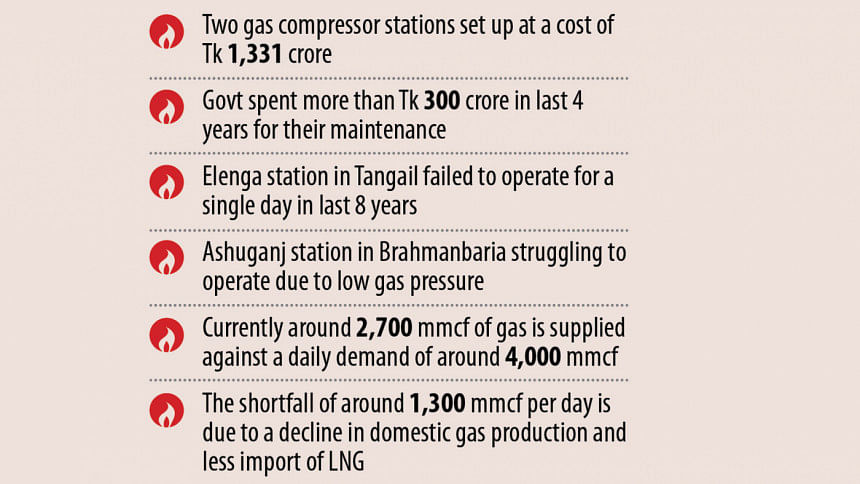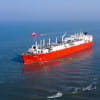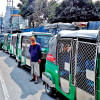Gas shortage leaves compressor stations inoperative

The government built two compressor stations in 2016 to supply gas at adequate pressure to different districts, but the expensive machinery has been underutilised due to inadequate gas flow.
The compressor at Elenga in Tangail has never been used because of inadequate gas supply.

The one in Ashuganj, Brahmanbaria, was used only 9.79 percent of the time in 2023.
The state-run Gas Transmission Company Limited (GTCL) built the facilities at a cost of Tk 1,331 crore. Most of the funds were borrowed from the Asian Development Bank.
South Korea's Hyundai Engineering Co Ltd set up the stations that, according to a recent Petrobangla report, have a "design life of 25 years". Almost a third of their life has elapsed.
From 2019-20 to 2022-23 fiscal years, GTCL paid Tk 309 crore to five foreign firms for operating, maintaining and servicing the machinery, according to a report by a technical committee of Petrobangla.
The compressors were supposed to be supplied with imported LNG and gas from the fields in Sylhet and Brahmanbaria.
The one in Ashuganj was supposed to supply households and businesses in and around the capital with adequate pressure of gas. The one in Elenga was meant to supply gas to the southwestern districts across the Jamuna river.
Both the compressors require at least 650 pounds per square inch (psi) at the intakes. The compressors are capable of raising the pressure to 1,000 psi, according to the report submitted to the GTCL in the last week of February.
From May 16, 2016, when the Ashuganj station began operation, to the end of 2022, the most it operated in a year was 94 percent of the time in 2019, and has been declining since.
After the Ashuganj station caters to the huge demand in Dhaka and Gazipur, there is not enough gas left for the Elenga station to operate, the report says.
In 2023, the average pressure in Elenga was 367 psi. When the facility was commissioned in 2016, the pressure was only 4.13 percent of the requirement of 650 psi, it adds.
According to Petrobangla data, around 2,700 million cubic feet per day (mmcfd) of gas is supplied to the national grid against a demand of around 4,000 mmcfd.
The shortfall persists thanks to the decline in gas production and inadequate import of LNG amid the foreign currency crunch.
As the compressor stations become a burden, the technical committee recommends the one in Elenga be used as a gas metering and flow control facility only.
The committee, formed in October last year, also recommends relocating the Elenga station to a suitable place in the southwestern region, subject to LNG import from India after 2026.
Since modifying the compressors to reduce their intake requirement will cost 7.2 million euros, it is not recommended.
Appointing local engineers to run the facilities would lower the operational and other costs, the report observes.
According to the project document, GTCL was supposed to train 25 of its engineers at the ESD Simulation Training Institute in Scotland.
The company's Managing Director Shahnewaz Parvez told The Daily Star that not all 25 officials received the training. Besides, those who received the training eventually did not work at the compressor stations because of their location in remote areas.
"As the salary is much higher in the power sector than the gas sector, some of them switched jobs," he said.
"If we find enough gas, the stations will run as they are supposed to," he added.
Zanendra Nath Sarker, chairman of Petrobangla, the parent organisation of GTCL, said, "Our primary target is to reduce operational costs of the stations. No decision has been made yet."
Prof M Shamsul Alam, vice-president of Consumers' Association of Bangladesh, said it seemed to him that the compressor stations were built in the first place to embezzle public money.
"They built these without properly measuring the gas flow. It is like the power plants that only receive capacity payments and do not generate electricity," says Shamsul Alam.
Due to such illogical investments, gas transmission fees increased threefold in the last few years, and the general public are bearing it.
"We have nothing to do but seek justice from the Almighty," Alam said.
Iftekharuzzaman, executive director of Transparency International Bangladesh, said building the facilities was an inexcusable wastage of public money.
"Question may be raised if the ADB as the source of the lion's share of the investment in the boneheaded project was motivated more by its own parochial interest in money lending business than value for money for Bangladesh.
"Equally depressing is that the only way the government could have fallen into the trap of the multilateral lender was perhaps because there was a vicious collusion of ADB officials with a section of powers that be. Neither can be absolved of the responsibility for the burden of this white elephant," he said.

 For all latest news, follow The Daily Star's Google News channel.
For all latest news, follow The Daily Star's Google News channel. 










Comments